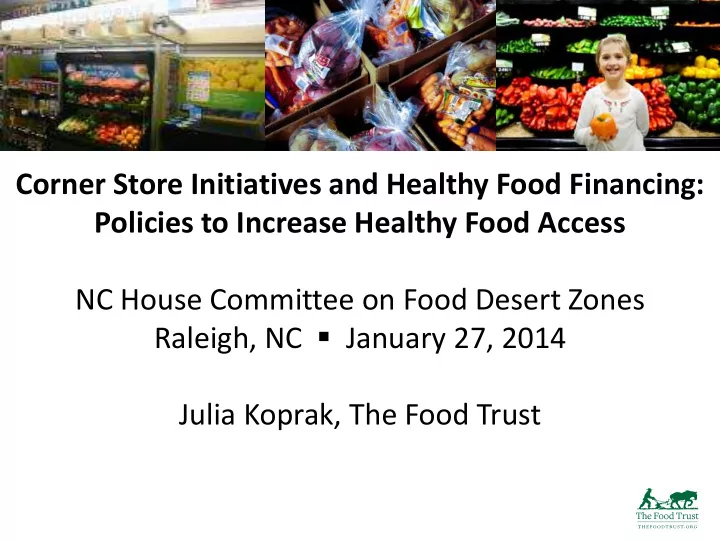

Corner Store Initiatives and Healthy Food Financing: Policies to Increase Healthy Food Access NC House Committee on Food Desert Zones Raleigh, NC January 27, 2014 Julia Koprak, The Food Trust
The Food Trust Since 1992, working to ensure that everyone has access to affordable nutritious food
Healthy food access is a public health issue . 1/27/2014
Obesity Trends in the US 1995 1985 Source: Behavioral Risk Factor Surveillance System, CDC 2010 No Data <10% 10% – 14% 15% – 19% 20% – 24% 25% –29% ≥30% 1/27/2014
1/27/2014
The alternatives in many places NC Committee on Food Desert Zones
The Grocery Gap: Key Research Findings • Accessing healthy food is a challenge for many Americans – particularly those living in low-income neighborhoods, communities of color, and rural areas. • Better access corresponds with healthier eating • Access to healthy food is associated with lower risk for obesity and other diet-related chronic diseases. • New and improved healthy food retail in underserved communities created jobs and helps to revitalize low-income neighborhoods. Available at: http://www.thefoodtrust.org 1/27/2014
Increasing healthy food access at corner stores and convenience stores
Why Corner Stores? • Supermarket deserts and customer dependence • Philadelphia study: 42% students shop 2 times/day; 53% shop once a day 356 calories per purchase • Energy dense, low-nutritive food and beverages • Engaging as ALLIES Chart Source: Food Geography: How Food Access Afftects Diet and Health. Available at http://www.thefoodtrust.org/pdf/Food%20Geography%20Final.pdf
What makes a healthy corner store? • Stocking healthier items (whole grains, low-fat dairy, fresh produce) • Increasing the quantity and shelf space for healthy options • Marketing to promote healthy foods • Technical Assistance to owners • Equipment and conversions
In-store marketing for healthy foods
A typical corner store aisle
The same corner store post- renovation
Examples of Healthy Corner Store Initiatives • Austin, TX • Camden, NJ • Kentucky (rural areas) • North Carolina (rural areas) • Philadelphia, PA • Richmond, VA • San Jose, CA
Healthy Food Financing: The Basics • Business financing programs that provide grants and loans for new and expanded grocery retailers in underserved communities • Administered by a variety of community development entities, especially CDFIs • Funded with federal, state, local, and philanthropic dollars
Healthy Food Financing Program Model Government or Foundation Provide seed funding Oversee program implementation Community Development Financial Institution & Food Access Organization Determine applicant Market program, Raise private capital Provide financing eligibility advocate for community Fresh Food Retail Projects in Underserved Communities Co-ops, farmers markets, and Supermarkets Small grocery stores other “non - traditional” formats
Healthy Food Financing Initiative Implementation Process Grocer applies for Food access CDFI provides financial incentives organization customized to build or expand screens for financing to store in a food eligibility. support store. desert.
Success Story: PA Fresh Food Financing Initiative 88 approved stores in PA urban/rural areas $190 million total invested 1.7 million sq. ft. of grocery retail developed/refreshed 5,000 jobs created/retained Fresh Grocer opens at Progress Plaza in North Philadelphia Named “Top 15 Innovation in December 2009 Government” by Harvard NC Committee on Food Desert Zones
Circle Food Store, New Orleans, 2005
Circle Food Store, New Orleans, 2014
Federal Healthy Food Financing Initiative • $118 Million awarded to CDFIs and CDCs from the U.S. Treasury and Dept of Health and Human Services • $400 Million in New Markets Tax Credits
1/27/2014
1/27/2014
1/27/2014
Thank You! Julia Koprak jkoprak@thefoodtrust.org 215-575-0444 x151 www.thefoodtrust.org www.healthyfoodaccess.org
Recommend
More recommend